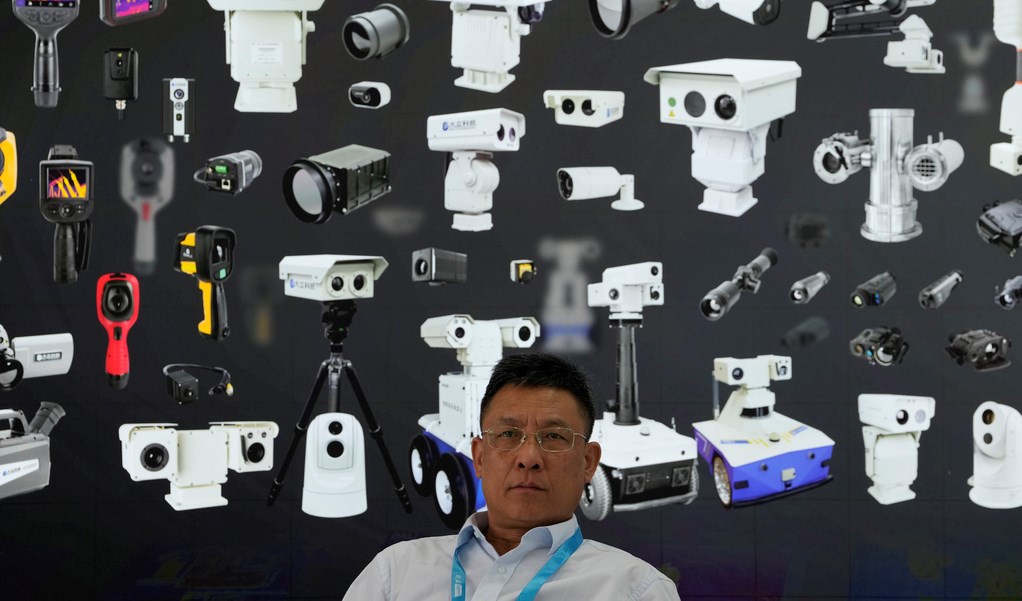US executive order prohibits or restricts investment in Chinese tech
A new executive order by US President Joe Biden restricts and prohibits US investment in certain Chinese tech industries, resulting in accusations by China that the US is aiming at disrupting supply chains.
-

A vendor sits near a board depicting surveillance cameras during Security China 2023 in Beijing, on June 9, 2023. (AP)
An executive order signed by US President Joe Biden on Wednesday is set to prohibit specific US investments in "sensitive technologies and products" in China.
In three industries—semiconductors and microelectronics, quantum information technology, and certain AI systems—the order empowers the US treasury secretary to prohibit or restrict some US investments in Chinese businesses.
The plan is aimed against investments in Chinese businesses producing chip-design software and manufacturing technologies. These sectors are primarily dominated by the US, Japan, and the Netherlands, but the Chinese government has been striving to develop domestic alternatives.
Although US officials said the limitations were designed to address "the most acute" national security risk factors and not to split the two nations' allegedly substantially interconnected economies, the new order may increase tensions between the world's two biggest economies.
According to Democratic Senate leader Chuck Schumer, "today the United States is taking a strategic first step to ensure American investment does not go to fund Chinese military advancement,” after claiming that “For too long, American money has helped fuel the Chinese military’s rise."
Read more: US driving Chinese scientists away amid tensions with China: FP
In turn, Republicans believed that Biden's order still did not go far enough. For example, House foreign affairs committee chairman Michael McCaul said, “the failure to include existing technology investments as well as sectors like biotechnology and energy is concerning.”
In response, according to The Guardian, the embassy of China in Washington voiced that Beijing was “very disappointed” by the move.
A spokesperson for the Chinese embassy in Washington said on Wednesday that China is “very disappointed” by the move. The embassy spokesperson, Liu Pengyu, said the order would seriously undermine the interests of Chinese and American companies and investors” further adding that “China will closely follow the situation and firmly safeguard our rights and interests.”
Chinese MFA spokesperson: #China strongly deplores and firmly opposes the #US’s single-minded rollout of restrictions on investments in China. We have made serious démarche to the US and will resolutely safeguard our rights and interests. https://t.co/jDKhlcLT4S
— Liu Pengyu 刘鹏宇 (@SpoxCHNinUS) August 10, 2023
Additionally, the Ministry of Commerce in Beijing pointed fingers at the US for their attempt to disrupt global industry and supply chains, reaffirming that Biden's executive order “seriously deviates from the market economy and fair competition principles the US has always promoted, and affects companies’ normal operation decisions."
In order to better clarify the program's scope and to allow for public discussion, regulators want to publish an advance notice of proposed rulemaking before submitting the formal proposal.
Read more: Trump says Biden is perceived as 'incompetent' by China
China hits back on US chip war, restricts export of some rare elements
China will curb the export of some critical material used in the chips industry in retaliation to growing US restrictions on China's access to the technology in attempts to cripple the country's advancement in the field, Reuters reported back in July.
The commerce ministry announced that the new controls aim to protect national security and interests. Exporting rare earth metals, such as gallium and germanium, now requires special permission.
Prior to the Chinese announcement, the US had stated that it was considering introducing more bans on semiconductor exports to China, claiming concerns over the possibility of its use in the military and cyber industry.
Read more: Biden signs on $52.7 bln microchip investment bill to 'counter China'
#Chinese companies wanting to export gallium or germanium will now need a license to do so, in addition to providing information on the destination, recipient and details about their end-use. A move that could definitely hurt the #US. pic.twitter.com/VQcGYQT1JK
— Al Mayadeen English (@MayadeenEnglish) August 7, 2023
Read more: US pressures allies into containing China Chips industry: Global Times

 3 Min Read
3 Min Read








